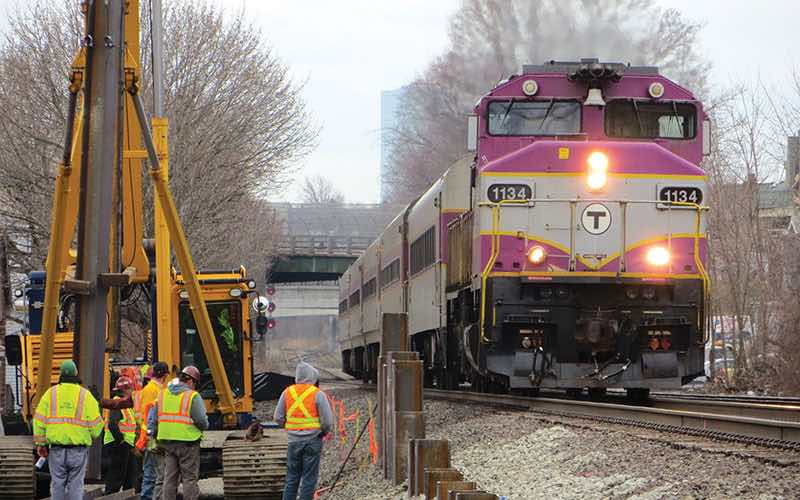
March 6, 2019 (BOSTON, MA) – Today, the Greater Boston Chamber of Commerce (GBCC), Conservation Law Foundation (CLF), and the MBTA Advisory Board published their first annual Accountability Report to assess the MBTA’s progress toward the goals set in the MBTA Strategic Plan, which was developed by the MBTA Fiscal and Management Control Board (FMCB) in 2017. The report can be found online here.
The 2019 Accountability Report shows that the MBTA is making progress in accomplishing some of its goals, such as taking steps to stabilize the operating budget, but it is also expecting significant challenges in the year ahead. The FMCB itself promised that 2019 would be a “turning-point” year when customers will see results from the first three years of work towards goals identified in the Strategic Plan. This year, the MBTA will shift from planning to project implementation, and there is much at stake. Several projects, such as doubling its annual capital investment, implementing expanded accessibility, and addressing climate vulnerability, face significant obstacles and are at risk of falling behind schedule. In the Accountability Report, the GBCC, CLF and MBTA Advisory Board urge the MBTA to prioritize capital investment, accessibility improvements, and climate vulnerability, which will improve riders’ experience in the short term, not just the long term.
“The FMCB and the MBTA deserve credit for the effort they’ve put into realizing Strategic Plan goals to date, but there’s much more work to be done,” said James E. Rooney, president and CEO of the GBCC. “Our hope is that this 2019 accountability check – and subsequent annual reports – provide the MBTA with the opportunity to reflect, adjust and change course as needed, and keep steadily progressing towards the 21st-century public transit system they’ve promised to deliver.”
“We must make it as easy as possible for people to get out of their cars and choose public transit, and that starts with a system that works for everyone,” said Staci Rubin, Senior Attorney at CLF. “It’s clear that the MBTA needs to focus on protecting the system from climate change and improving accessibility. These aren’t always the most visible projects, but they’re critical if we’re going to have a transportation system that is prepared for the future and doesn’t leave anyone behind.”
This is a critical period for the MBTA. The successful implementation of the projects included in this Strategic Plan can mark the beginning of a period of growth and reliability for the MBTA,” said Paul Regan, Executive Director of the MBTA Advisory Board. “We need the Strategic Plan to be successful because Massachusetts needs a vital and dependable MBTA for a sustainable future.”
To develop the Accountability Report, the three organizations identified 44 measurable goals within the Strategic Plan and assessed the MBTA’s progress on each goal using publicly-available data and additional information provided by the MBTA. This year’s report focuses on goals with deadlines on or before December 2018. It covers work in four key categories: fiscal sustainability, infrastructure, customers, and management. The MBTA made good progress on improving fiscal stability and management; however, it has not met all its goals related to infrastructure and customers.
The GBCC, CLF and MBTA Advisory Board will publish the next Accountability Report in the first quarter of 2020. The report will focus on major initiatives, including achieving stability in the operating budget and executing the $8 billion, five-year capital plan. The three organizations will hold the MBTA accountable to its goals by examining progress on an updated MBTA Strategic Plan, a capital planning review, new Red and Orange Line car deliveries, the Better Bus Project, and a future governance structure following the FMCB termination in 2020.
About the Greater Boston Chamber of Commerce
The Greater Boston Chamber of Commerce is the convener, voice and advocate of our region’s business community, committed to making Greater Boston the best place for businesses and people to thrive. It helps its members and Greater Boston succeed by convening and connecting the business community; researching, developing and advocating for public policies that contribute to our region’s economic success; and providing comprehensive leadership development programs designed to grow strong business and civic leaders. Learn more at BostonChamber.com.
About the Conservation Law Foundation
CLF protects New England’s environment for the benefit of all people. We use the law, science and the market to create solutions that preserve our natural resources, build healthy communities, and sustain a vibrant economy. We’re working to cut pollution from our cars and trucks, create alternatives to driving, and push for more affordable and equitable public transit options across New England. To learn more about our work, visit www.clf.org.
About the MBTA Advisory Board
The MBTA Advisory Board was created in the same legislation that created the MBTA to serve as oversight and voice of the communities served by the MBTA. We monitor the MBTA’s spending and capital plans and track the performance of the MBTA’s service. The MBTA Advisory Board advocates on behalf of its members and on behalf of the transit-riding public. Learn more at mbtaadvisoryboard.org.
###
